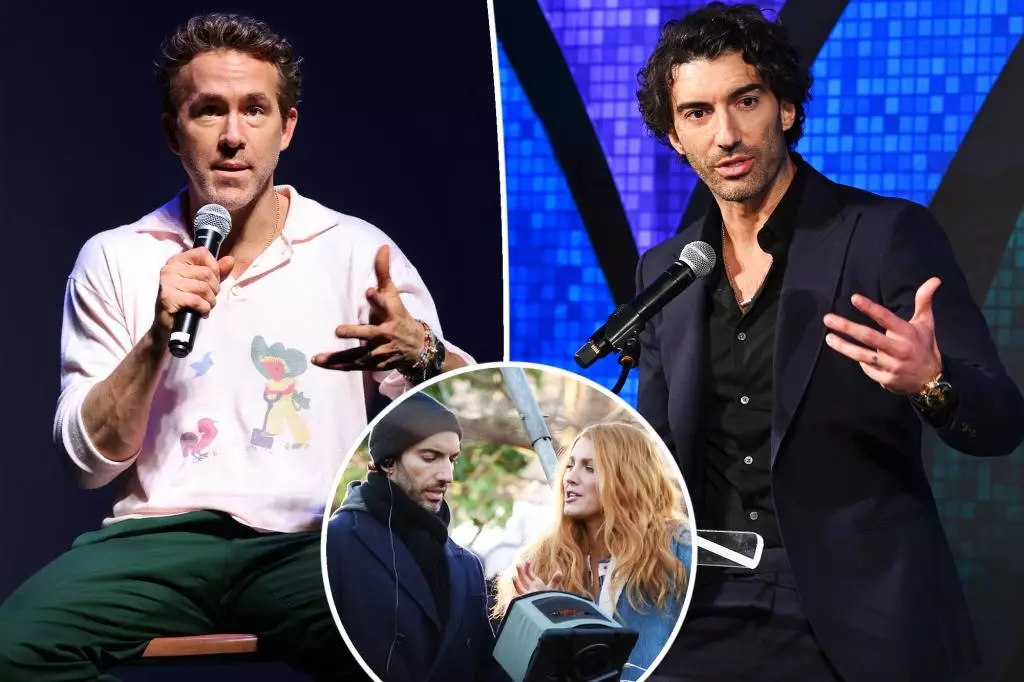In the realm of Hollywood, where the sheen of celebrity often cloaks deeper, more troubling realities, a recent incident has dragged the name of prominent figures like Ryan Reynolds, Blake Lively, and Justin Baldoni into the spotlight. Convoluted exchanges on social media and allegations of sexual harassment have painted a complex picture of interpersonal relationships and professional boundaries within the film industry. This article seeks to delve into the implications of these developments and what they signify about the broader context of celebrity culture.
The elementary act of blocking someone on social media may seem trivial at first glance, but in the context of Hollywood’s intricate web of relationships, it can signify much more. The reported instance of Ryan Reynolds allegedly blocking Justin Baldoni raises eyebrows, particularly when it comes in the wake of significant allegations made by Blake Lively against Baldoni. For an industry often reliant on public image, these seemingly minor social media actions can manifest as a recoil from discomfort or even distrust.
Baldoni’s concerns—expressed via text about whether Lively might follow suit—underscore an inherent fear of backlash within the industry. It reveals a vulnerability that many public figures experience when charges of misconduct arise. In moments of uncertainty, established strategies to maintain a sense of control can mitigate feelings of anxiety. This is particularly true in an industry where reputations can be fragile, serving as a constant reminder of how fast-standing relationships can dissolve under the scrutiny of public opinion.
The heart of the controversy lies in Blake Lively’s allegations against Justin Baldoni. According to details acquired by media outlets, Lively’s complaint outlines disturbing behaviors that reportedly created a toxic environment on the set of “It Ends With Us.” Allegations of sexual harassment are never trivial; they can resonate throughout an individual’s career, causing significant personal and professional ramifications. Lively’s claims included a request for Baldoni to cease behavior that made her uncomfortable, from the sharing of inappropriate material to inappropriate inquiries about her personal life.
This situation prompts a critical examination of systemic issues within Hollywood. The industry’s history is fraught with similar tales—of power dynamics where victims often find themselves silenced. The request for Balboni to adhere to certain behavioral expectations shines a light on established protocols in filmmaking that should prioritize respect above creative expression. If true, the allegations indicate a larger, systemic failure in protecting individuals, especially women, in creative spaces.
Following Lively’s allegations, Baldoni’s legal team issued a vehement denial, claiming that the assertions were “categorically false” and “outrageous.” Such dismissals often emerge in these scenarios, echoing the defensive postures taken by many accused individuals. While it is essential to allow for due process and fair legal representation, it’s equally crucial to remember the power dynamics at play. The fervent denial raises questions: What does it mean for those who might feel compelled to come forward with their own experiences?
Adding another layer to this ongoing narrative, Baldoni allegedly engaged a crisis management professional amid this turmoil, a move indicative of the harsh realities celebrities face in damage control. Lively herself expressed a desire to expose “sinister retaliatory tactics” in her statements, indicating her commitment to advocating for those who face similar situations. This perspective offers a glimpse into the emotional toll such conflicts can exert on individuals, who often find themselves pitted against powerful forces within the industry.
As this unfortunate situation continues to unfold, it serves as a reminder that Hollywood’s glitzy surface can often hide a plethora of issues underlying relationships, professionalism, and human decency. Social media interactions, allegations of harassment, and defensive legal strategies highlight the complexity of navigating personal and professional lives under the public eye.
Ultimately, the incident involving Ryan Reynolds, Blake Lively, and Justin Baldoni is more than just gossip fodder for tabloids; it serves as a crucial touchpoint for discussions on respect, boundary-setting, and protection against misconduct. In an age where more people feel empowered to speak up about their experiences, it becomes vital for industry leaders and creatives alike to foster environments where everyone feels safe and respected. This moment could well be a catalyst for significant change, emphasizing the necessity of prioritizing humanity over celebrity.


Leave a Reply